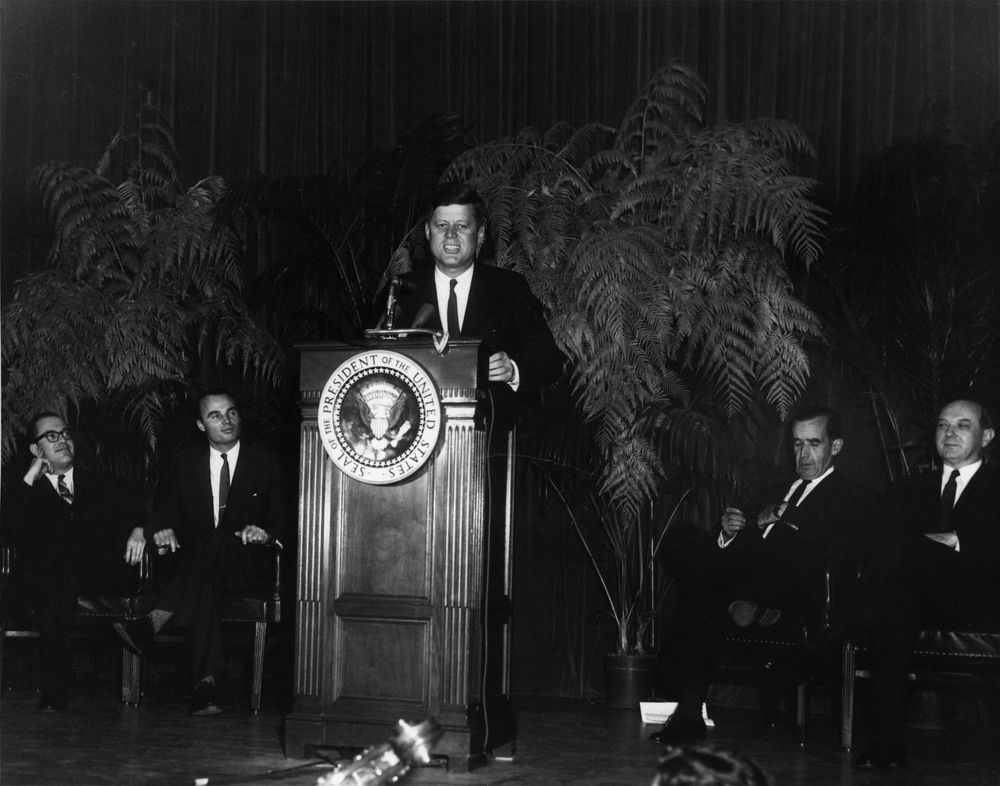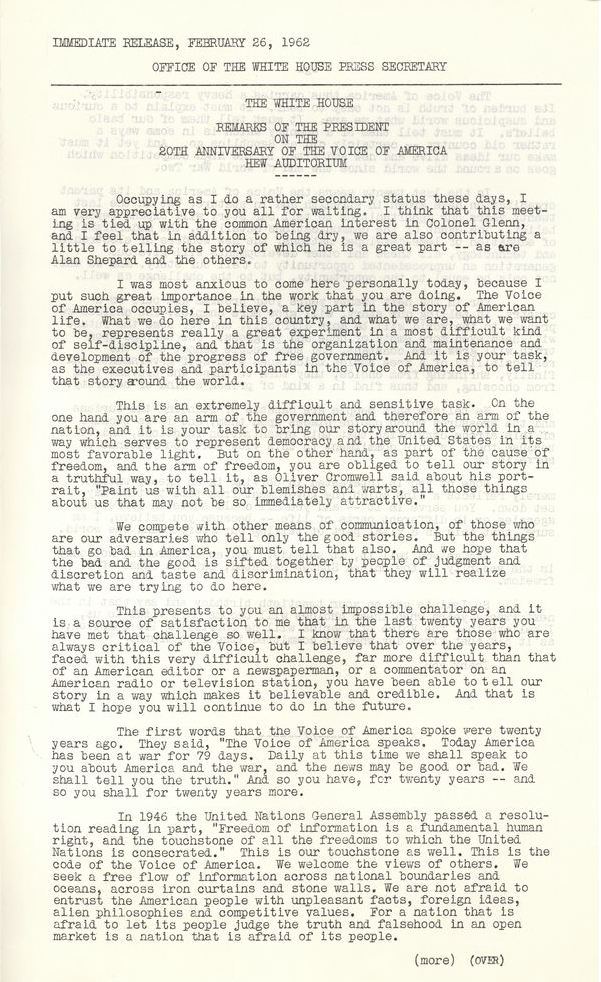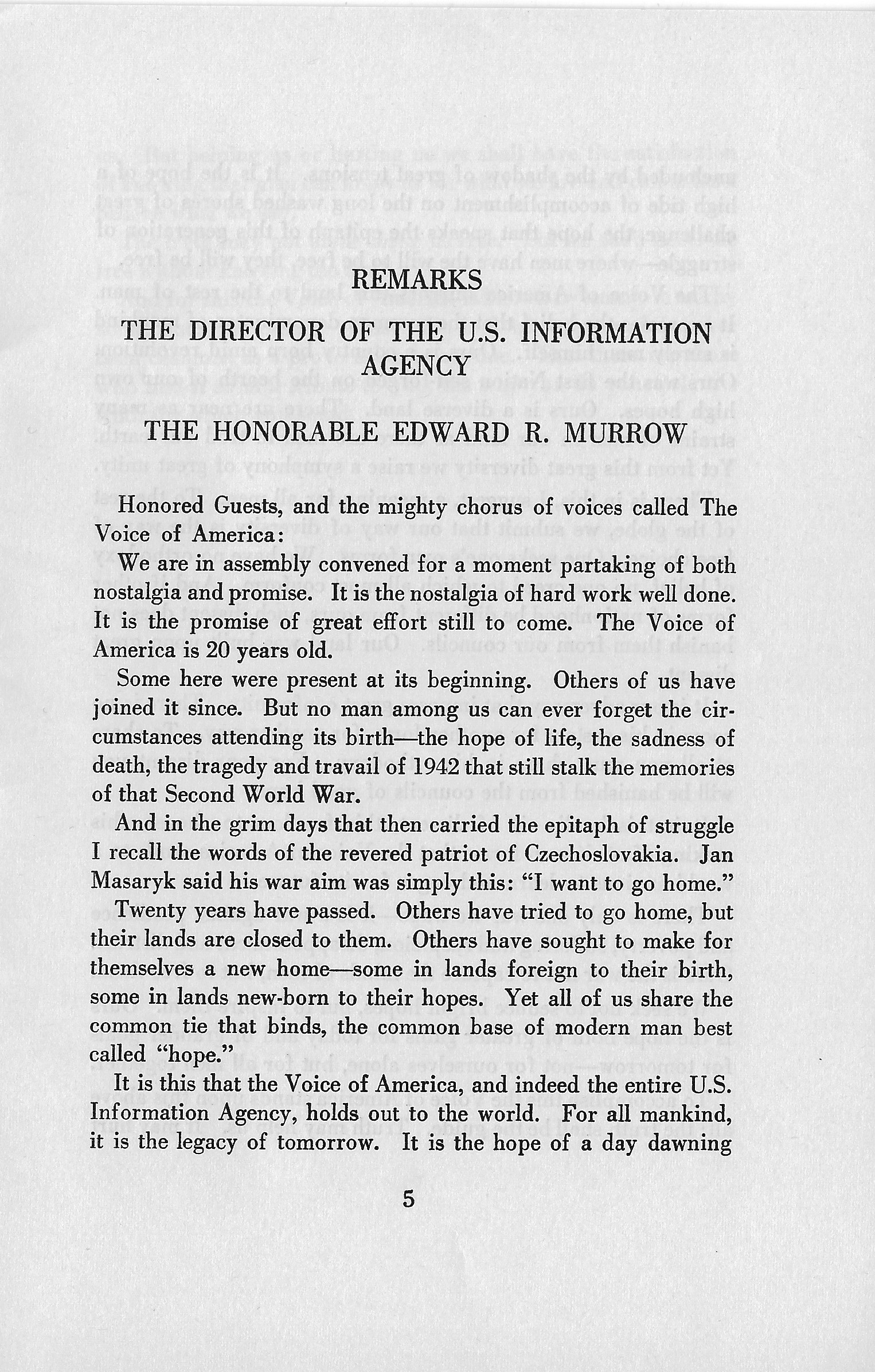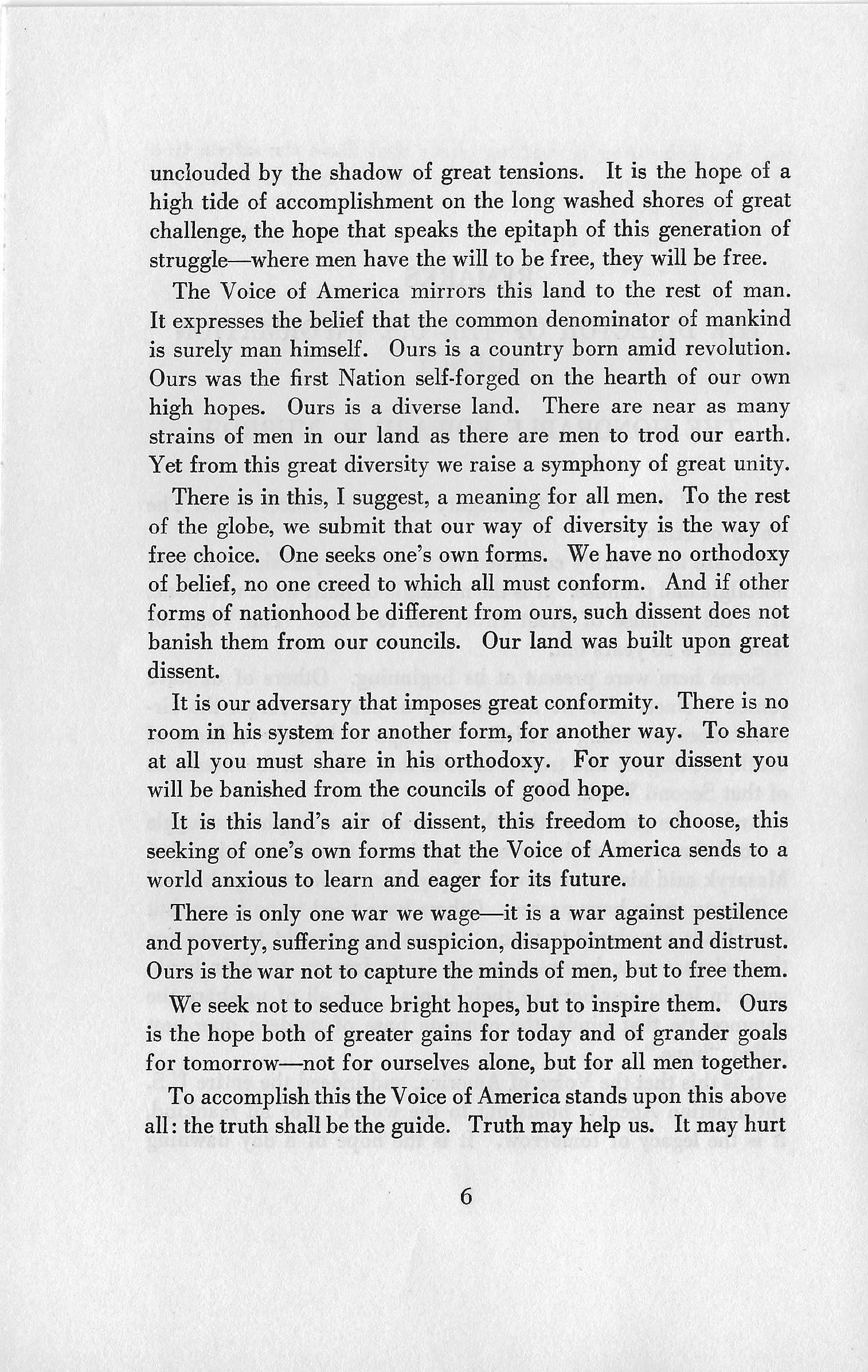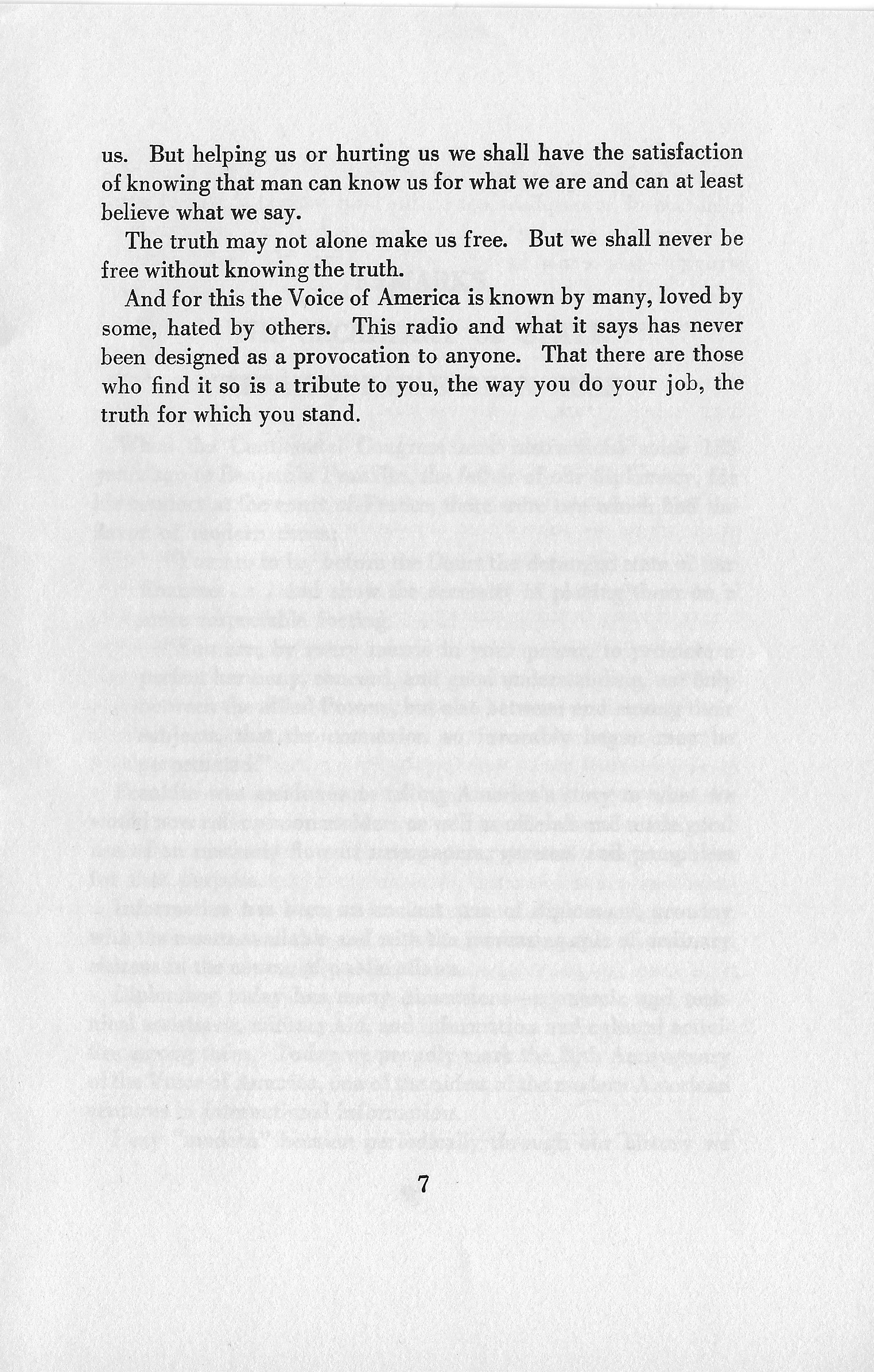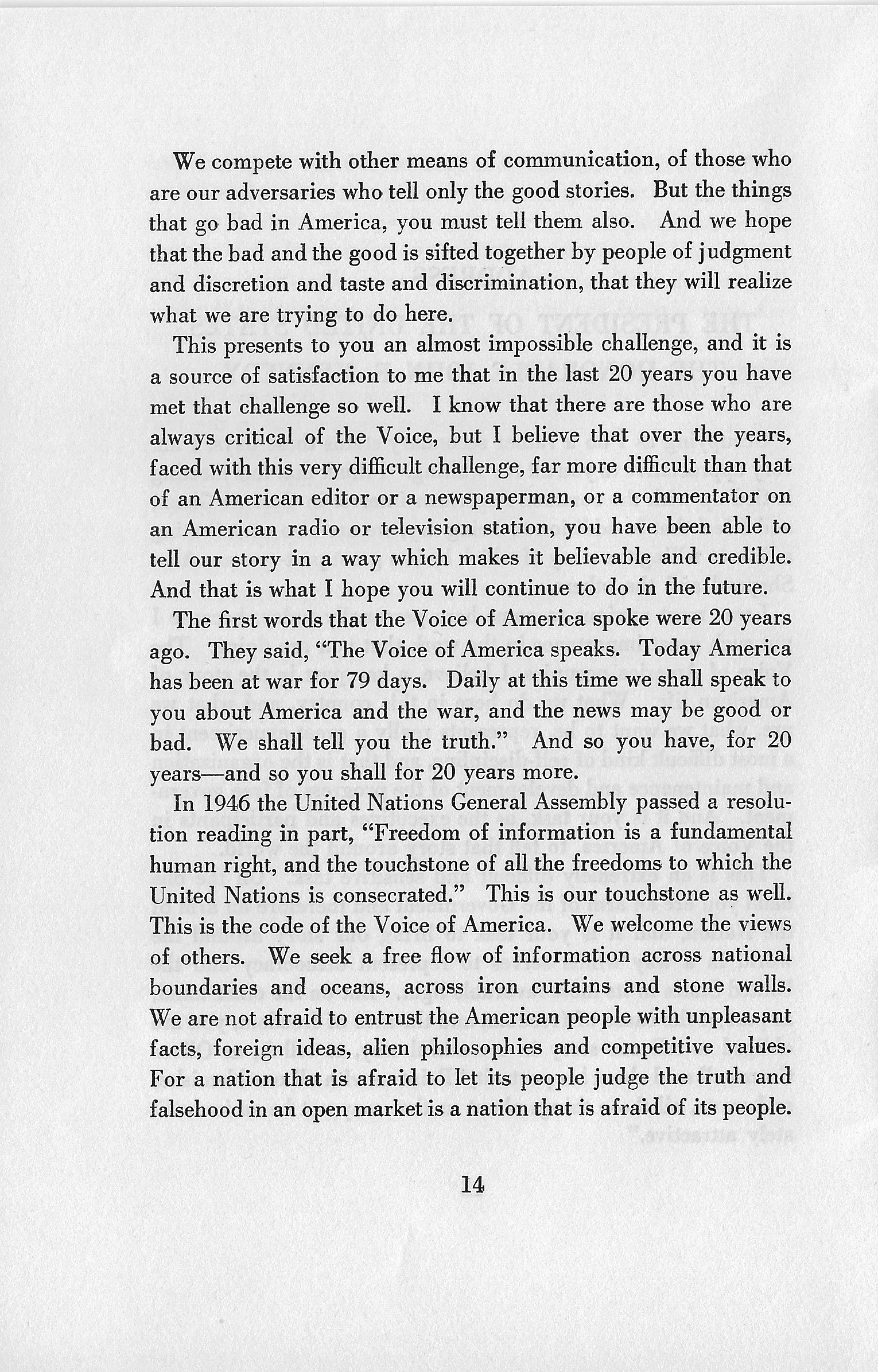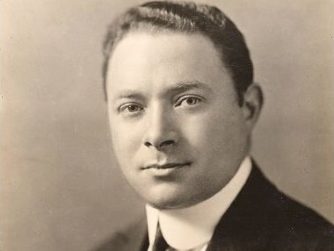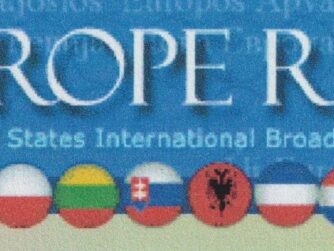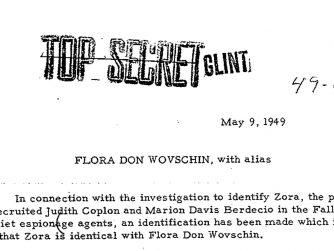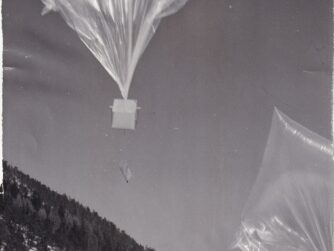Commentary by Ted Lipien
 In his February 26, 1962 speech to mark the 20th anniversary of the Voice of America (VOA), President Kennedy discussed the necessity of freedom of information and complete truthfulness of the press, but he also argued that the Voice of America is different from private U.S. news media. He pointed out that VOA managers, editors and broadcasters have a more difficult job than private media reporters and a much higher level of responsibility in carrying out their mission on behalf of the United States Government and the American people. “I believe that over the years, faced with this very difficult challenge, far more difficult than that of an American editor or a newspaperman, or a commentator on an American radio or television station, you have been able to tell our story in a way which makes it believable and credible,” President Kennedy said in his remarks to VOA government managers and broadcasters.
In his February 26, 1962 speech to mark the 20th anniversary of the Voice of America (VOA), President Kennedy discussed the necessity of freedom of information and complete truthfulness of the press, but he also argued that the Voice of America is different from private U.S. news media. He pointed out that VOA managers, editors and broadcasters have a more difficult job than private media reporters and a much higher level of responsibility in carrying out their mission on behalf of the United States Government and the American people. “I believe that over the years, faced with this very difficult challenge, far more difficult than that of an American editor or a newspaperman, or a commentator on an American radio or television station, you have been able to tell our story in a way which makes it believable and credible,” President Kennedy said in his remarks to VOA government managers and broadcasters.
In his earlier comments on U.S. international broadcasting, President Kennedy in prepared remarks for a meeting with the Radio Free Europe Fund at the White House on February 7, 1962 outlined a significantly different, more vigorous and broader mission for U.S. supported surrogate radios: Radio Free Europe and Radio Liberty. Radio Free Europe Fund was run by a group of businessmen and other prominent Americans who solicited private funds for the American-managed stations based since the early 1950s in Munich, West Germany. These contributions from private Americans represented only a very small part of the organization’s budget–the rest of the money came secretly at the time from the CIA, as did some of the key American managers, while the language services themselves were operated by refugee journalists and political activists living in exile. President Kennedy noted that Voice of America broadcasts alone were not enough to overcome censorship behind the Iron Curtain.
“We have, as you know, a powerful instrument in the information world in the Voice of America. It will play a vital role in the resurgence of the Eastert European countries. But it is not enough. The Voice of America is the voice of this Government. Radio Free Europe must be the voice not only of our people, but of the people of all of Europe. RFE must continue to help get the truth behind the Iron Curtain. It must give them information which their Soviet-dominated chieftans would keep from them.”[ref]Papers of John F. Kennedy. Presidential Papers. President’s Office Files. Subjects. Radio Free Europe Fund[/ref]
President John F. Kennedy, Prepared Remarks to Radio Free Europe Fund, February 7, 1962
In his prepared remarks to supporters of Radio Free Europe, Kennedy described the Voice of America as “the voice of this Government,” but judging from his later use of this term, he did not mean that VOA should only be the voice of the White House and the administration. He offered a more precise description of the Voice of America for the audience listening to his speech at the 20th anniversary ceremonies, calling VOA “an arm of the Government and therefore an arm of the Nation.”
Attending the anniversary event in addition to President Kennedy were the Voice of America Director Henry Loomis, United States Information Agency (USIA) Director Edward R. Murrow and Secretary of State Dean Rusk. In their remarks delivered before Kennedy arrived, they expressed similar ideas about VOA’s journalistic mission combined with public diplomacy outreach abroad for the United States. By saying that VOA is “an arm of the Nation,” President Kennedy may have tried to impress upon his audience that the U.S. government-run broadcaster should present the views not only of the executive branch and the rest of the U.S. Government, particularly the U.S. Congress, but should also reflect the views of Americans of all political persuasions.
At that time, Kennedy did not have to state explicitly or try to explain that as a government-run institution being funded by American taxpayers, the Voice of America cannot be seen as being partisan in the way most private media are in the United States and in other democratic nations where not only commentators but also reporters and their outlets align themselves with the ideologies of the left or the right and through their reporting and commentary drive political debate and political change. Partisan press is essential for the normal functioning of any democracy, whether in America or abroad. But as an astute politician, Kennedy knew that under the First Amendment protection of free press, any fully government-funded and government-run organization such as the Voice of America could not and should not have a domestic media role in the United States. He would have known that Americans would not tolerate such an unnatural government-supported media entity as a domestic broadcaster in the way that some Europeans have accepted public funding for their national and international broadcasters, with the BBC being one of the best known examples.
This was a widely accepted understanding in the United States at the time, partly thanks to the 1948 Smith-Mundt Act which restricted domestic distribution of VOA news. Congress passed the law after numerous abuses against domestic U.S. media by the Roosevelt administration acting through the Office of War Information where VOA broadcasts for foreign audiences originated, with some of the English-language programs also being rebroadcast in the United States. The OWI’s engagement in domestic propaganda and illegal censorship during World War II were exposed by members of Congress in the 1940s and the early 1950s and the Smith-Mundt Act was designed to prevent it from happening again in the future.
During World War II, VOA broadcasters horrified victims of communist repression abroad with their pro-Kremlin line.[ref]As described by a Polish radio journalist Czesław Straszewicz who at the time of the Warsaw Uprising was working in London, wartime Voice of America broadcasts from Washington followed the Soviet example of ignoring the Polish resistance. STRASZEWICZ: “With genuine horror we listened to what the Polish language programs of the Voice of America (or whatever name they had then), in which in line with what [the Soviet news agency] TASS was communicating, the Warsaw Uprising was being completely ignored.
I remember as if it were today when the (Warsaw) Old Town fell [to the Nazis] and our spirits sank, the Voice of America was broadcasting to the allied nations describing for listeners in Poland in a happy tone how a woman named Magda from the village Ptysie made a fool of a Gestapo man named Mueller.
Czesław Straszewicz, “O Świcie,” Kultura, October, 1953, 61-62.
I am indebted to Polish historian of the Voice of America’s Polish Service Jarosław Jędrzejczak for finding this reference to VOA’s wartime role.[/ref] In a collusion kept secret from the U.S. Congress and the American people, Roosevelt administration officials in charge of Voice of America wartime broadcasts, including FDR’s speechwriter Robert E. Sherwood, coordinated U.S. propaganda with Soviet propaganda. Later VOA continued to cover up information about Stalin’s crimes until the official censorship stopped due to congressional criticism in the early 1950s. Pro-Soviet domestic propaganda by U.S. government broadcasters already ceased in 1945 with the shutting down of the Office of War Information by President Harry Truman. Kennedy did not have to declare it outright, but his speech made it quite clear that VOA had no domestic media role with any of the controversies that could ensue and threaten its important mission abroad and its public funding.
President Kennedy stressed to employees and guests that Voice of America broadcasters have an extremely difficult and sensitive task of representing democracy and the United States, as he said, “in its most favorable light.” That is also a drastically different role than the one followed by most domestic partisan media or news outlets claiming to be politically neutral. But Kennedy also stressed repeatedly that VOA must present both the good and the bad about America in a truthful way. He said that VOA broadcasters charged with this difficult and sensitive task must be people of “judgement,” “discretion,” “taste and discrimination.” His was not a description of an American private media organization in which owners, editors and reporters can decide on their own to be or not to be partisan, to be or not to be advocates for various causes while only being concerned with how the audience and the advertisers might react. Kennedy’s speech defined VOA’s mission as supporting freedom and democracy abroad while explaining America and its basic beliefs to foreign audiences with a completely truthful narrative.
“We compete with other means of communication, of those who are our adversaries who tell only the good stories. But the things that go bad in America, you must tell them also. And we hope that the bad and the good is sifted together by people of judgment and discretion and taste and discrimination, that they will realize what we are trying to do here.”President John F. Kennedy, Remarks on the 20th anniversary of the Voice of America, 26 February 1962
President Kennedy’s speech marking the 20th anniversary of the Voice of America was thus significant in setting what became later the key principles of the 1976 VOA Charter with its emphasis on accuracy, balance and comprehensiveness of news, presentation of variety of significant American opinions, and representing U.S. official policies clearly and effectively. One of the provisions of the VOA Charter, which Kennedy supported in his speech even before it became law, says that “VOA will represent America, not any single segment of American society, and will therefore present a balanced and comprehensive projection of significant American thought and institutions.”
No private media organization in the United States has such specific requirements or restrictions on partisan political advocacy imposed by U.S. law, although in practice this mandate has not been always followed by some of the more recent VOA directors and officials of VOA’s current parent agency, the Broadcasting Board of Governors (BBG).
The BBG’s predecessor, the United States Information Agency, had a core workforce of professional, foreign policy and public diplomacy experts who went to great lengths to suppress and not to show their partisan inclinations which most people, especially journalists, have. USIA’s Foreign Service Officers and key VOA broadcasters were selected through competitive exams. There were some instances of censorship by USIA diplomats, but VOA’s reporting standards remained high and its strong impact abroad during most of the Cold War was generally acknowledged. Pro-Soviet propaganda in VOA programs in the 1940s and reluctance to counter Soviet propaganda in the early 1950s were replaced with more honest reporting when the Voice of America was transferred from the State Department to USIA in 1953.
Radio Free Europe and Radio Liberty, which operated outside of U.S. government administrative structures, with funding provided secretly by the CIA until the early 1970s and later directly from the U.S. Congress, was even more successful in countering communist propaganda during the Cold War. It was also much more feared by communist regimes than VOA. Several days before speaking to Voice of America broadcasters on February 26, 1962, President Kennedy had a separate meeting with Americans running and supporting Radio Free Europe and Radio Liberty. In his remarks to Radio Free Europe Fund, Kennedy praised “Radio Free Europe’s vital service as a lifeline of truth to the peoples of Eastern Europe.”[ref]Papers of John F. Kennedy. Presidential Papers. President’s Office Files. Subjects. Radio Free Europe Fund[/ref]
“Walled in from freedom, constantly exposed to the drumfire of Communist propaganda, the East Europeans must depend to a great extent on Western broadcasts for reliable news and information. Radio Free Europe has provided a window on reality to those who are forced to live behind the bars of censorship and jamming. That is the least we can do for them.”[ref]Papers of John F. Kennedy. Presidential Papers. President’s Office Files. Subjects. Radio Free Europe Fund[/ref]
President John F. Kennedy’s February 7, 1962 Letter to Mr. Charles H. Kellstadt, Chairman of the Board Sears, Roebuck & Company, Chairman of Radio Free Europe Fund
The United States Information Agency, while clearly linked with the foreign policy establishment of the State Department, was largely focused on public diplomacy. To an even greater extent than other U.S. federal government employees, USIA officials and VOA broadcasters were strictly forbidden from showing domestic political sympathies in public. If they did, they would be fired from their government positions.
The current Broadcasting Board of Governors, on the other hand, while ostensibly bipartisan in its overall membership–with the party controlling the White House having the majority of votes–has had board members holding and publicly expressing highly partisan views. Some have made large financial contributions to partisan political campaigns and causes. Their expertise has been mostly in commercial media and domestic party politics, with only a few specialists in public diplomacy serving as BBG board members. Some of them have engaged in corporate business in countries such as Russia and China where authoritarian governments control who among foreign firms can make a profit. Such business activities abroad with enormous potential for conflicts of interest were absolutely not allowed for former USIA and VOA officials and rank-and-file employees. Their contacts with officials of communist governments had to be reported to the agency’s office of security.
With the end of the Cold War and the new bureaucratic structure in the Broadcasting Board of Governors, the Voice of America saw itsprofile in Washington greatly diminished. U.S. Presidents have stopped mentioning VOA or Radio Free Europe/Radio Liberty (RFE/RL) as America’s key defense against hostile propaganda and disinformation as it was together with Radio Free Europe and Radio Liberty during the Cold War. Presidents and Secretaries of State have stopped visiting the Voice of America headquarters. The U.S. Postal Service no longer issues stamps to mark VOA anniversaries.
There has been some recent media attention on what President Donald Trump might do with regard to the Voice America, with fears being expressed by some partisan media on the left that he might make VOA a tool of domestic partisan warfare and partisan propaganda. Trump has not done anything about VOA or the BBG as of late March 2018 and has not yet officially nominated anyone to be confirmed by the U.S. Senate as the new CEO and Director of the Broadcasting Board of Governors.
But with the exception of The Wall Street Journal, most major mainstream U.S. media have missed the real, much larger and much more disturbing story. The Voice of America has already become a highly partisan domestic media outlet. In an unprecedented departure from the past, some VOA services posted online full-length political commercials for Hillary Clinton and a political message attacking Donald Trump as “dog” and “pig” during the 2016 U.S. presidential election campaign. Some VOA reporters expressed on social media their personal distaste for Donald Trump, used obscene memes to defame him, and ridiculed his family. Even Senator Bernie Sanders became a target of a partisan, one-sided VOA attack-commentary. Supporters charged that a US state media” ran a “hit piece on Bernie Sanders.” VOA reporters familiar with the history of nonpartisan coverage complained that on the election night in November 2016, the Voice of America already had two pre-written programs about Hillary Clinton as the next president of the United States but none for Donald Trump.
Such behavior by U.S. government officials in charge of the Voice of America and its employees would not have been even remotely tolerated by VOA’s or USIA’s management during the Kennedy administration against any Republican politician. The same would have been true for any Republican administration during the Cold War. The time when President John F. Kennedy spoke so eloquently about Voice of America’s noble mission abroad is now largely only a historical memory.
But what even Kennedy and many others may have not fully realized at the time when it was not yet a major issue, as well as now when it is, is that without a clearly defined and limited mission, strong management by experts, keen public interest and effective oversight, a line set by the executive branch of the Government can be easily replaced by a much more restrictive ideological line set insidiously by partisan officials, individual bureaucrats, and partisan reporters despite the fact that they are federal employees bound to observe the rule of law.
“For in the next 20 years your problem and ours as a country, in telling our story, will grow more complex. The choices we present to the world will be more difficult, and for some the future will seem even more empty of hope and progress. The barrage upon truth will grow more constant, and some people cannot bear the responsibility of a free choice which goes with self-government. And finally, shrinking from choice, they turn to those who prevent them from choosing, and thus find in a kind of prison a kind of security.
We believe that people are capable of standing the burdens and the pressures which choice places upon them, and it is because of this strong conviction that this organization functions, and it is because there is this commitment to this view that you continue to serve in it.
None of you is interested in serving in an agency which merely reflects a line which the Government from time to time may set down. You serve in it—and you all could serve in different agencies or in different parts of life—because you believe, I am sure, that this is a vital part of telling our story around the world.
And as you tell it, it spreads. And as it spreads, not only is the security of the United States assisted, but the cause of freedom.”
President John F. Kennedy, Remarks on the 20th anniversary of the Voice of America, 26 February 1962
President John F. Kennedy Greets Guests at Ceremony Marking 20th Anniversary of the Voice of America
President John F. Kennedy greets guests at a celebration of Voice of America’s twentieth year of broadcasting as part of the United States Information Agency (USIA), in the auditorium of the Department of Health, Education, and Welfare (HEW), Washington, D.C.[ref]Abbie Rowe. White House Photographs. John F. Kennedy Presidential Library and Museum, Boston[/ref]
President Kennedy apologized for arriving late and missing the ceremony which included speeches by the Director of the Voice of America henry Loomis, the Director of the United States Information Agency Edward R. Murrow, and the Secretary of State Dean Rusk.
Before the President’s arrival, four Voice of America broadcasters, introduced by VOA Director Henry Loomis, read in their own languages the following message:
“The Voice of America, on its 20th birthday, greets its listeners and wishes you much happiness.”
They were:
Mrs. Dala Khleif, in Arabic;
Mrs. Mei-Sien Huang, in Chinese;
Mr. Victor Franzusoff, in Russian;
Mr. Herbert Morales, in Spanish.
Sound Recording of VOA Message in Arabic, Chinese, Russian, and Spanish
President John F. Kennedy Speaks at Ceremony Marking 20th Anniversary of the Voice of America
President John F. Kennedy speaks at a celebration of Voice of America’s twentieth year of broadcasting as part of the United States Information Agency (USIA), in the auditorium of the Department of Health, Education, and Welfare (HEW), Washington, D.C. Seated behind President Kennedy are (L-R): Unidentified; Henry Loomis, Director of Voice of America; Edward R. Murrow, Director of USIA; Secretary of State Dean Rusk.[ref]Abbie Rowe. White House Photographs. John F. Kennedy Presidential Library and Museum, Boston[/ref]
Sound Recording of President Kennedy’s Remarks for 20th Anniversary of the Voice of America
Sound recording of President John F. Kennedy’s remarks at a celebration commemorating the 20th anniversary of the Voice of America held in the Health, Education, and Welfare Auditorium.
Remarks on the 20th anniversary of the Voice of America, 26 February 1962

ADDRESS
THE PRESIDENT OF THE UNITED STATES
THE HONORABLE JOHN F. KENNEDY
Occupying as I do a rather secondary status these days, I am very appreciative to you all for waiting. I think that this meeting is tied up with the common American interest in Colonel Glenn, and I feel that in addition to being dry, we are also contributing a little to telling the story of which he is a great part—as are Alan Shepard and the others.
I was most anxious to come here personally today, because I put such great importance in the work that you are doing. The Voice of America occupies, I believe, a key part in the story of American life. What we do here in this country, and what we are, what we want to be, represents really a great experiment in a most difficult kind of self-discipline, and that is the organization and maintenance and development of the progress of free government. And it is your task, as the executives and participants in the Voice of America, to tell that story around the world.
This is an extremely difficult and sensitive task. On the one hand you are an arm of the Government and therefore an arm of the Nation, and it is your task to bring our story around the world in a way which serves to represent democracy and the United States in its most favorable light. But on the other hand, as part of the cause of freedom, and the arm of freedom, you are obliged to tell our story in a truthful way, to tell it, as Oliver Cromwell said about his portrait, “Paint us with all our blemishes and warts, all those things about us that may not be so immediately attractive.”
We compete with other means of communication, of those who are our adversaries who tell only the good stories. But the things that go bad in America, you must tell them also. And we hope that the bad and the good is sifted together by people of judgment and discretion and taste and discrimination, that they will realize what we are trying to do here.
This presents to you an almost impossible challenge, and it is a source of satisfaction to me that in the last 20 years you have met that challenge so well. I know that there are those who are always critical of the Voice, but I believe that over the years, faced with this very difficult challenge, far more difficult than that of an American editor or a newspaperman, or a commentator on an American radio or television station, you have been able to tell our story in a way which makes it believable and credible. And that is what I hope you will continue to do in the future.
The first words that the Voice of America spoke were 20 years ago. They said, “The Voice of America speaks. Today America has been at war for 79 days. Daily at this time we shall speak to you about America and the war, and the news may be good or bad. We shall tell you the truth.” And so you have, for 20 years—and so you shall for 20 years more.
In 1946 the United Nations General Assembly passed a resolution reading in part, “Freedom of information is a fundamental human right, and the touchstone of all the freedoms to which the United Nations is consecrated.” This is our touchstone as well. This is the code of the Voice of America. We welcome the views of others. We seek a free flow of information across national boundaries and oceans, across iron curtains and stone walls. We are not afraid to entrust the American people with unpleasant facts, foreign ideas, alien philosophies and competitive values. For a nation that is afraid to let its people judge the truth and falsehood in an open market is a nation that is afraid of its people.
The Voice of America thus carries a heavy responsibility. Its burden of truth is not easy to bear. It must explain to a curious and suspicious world what we are. It must tell them of our basic beliefs. It must tell them of a country which is in some ways a rather old country—certainly old as Republics go. And yet it must make our ideas alive and new and vital in the high competition which goes on around the world since the end of World War Two.
In the last 20 years the Voice of America and its parent organization have grown in strength and in stature, but in the next 20 years our opportunities to tell our story will expand beyond belief. The event of the Communications Satellite, the modernization of education of less-developed nations, the new wonders of electronics and technology, all these and other developments will give our generation an unprecedented opportunity to tell our story. And we must not only be equal to the opportunity, but to the challenge as well.
For in the next 20 years your problem and ours as a country, in telling our story, will grow more complex. The choices we present to the world will be more difficult, and for some the future will seem even more empty of hope and progress. The barrage upon truth will grow more constant, and some people cannot bear the responsibility of a free choice which goes with self-government. And finally, shrinking from choice, they turn to those who prevent them from choosing, and thus find in a kind of prison a kind of security.
We believe that people are capable of standing the burdens and the pressures which choice places upon them, and it is because of this strong conviction that this organization functions, and it is because there is this commitment to this view that you continue to serve in it.
None of you is interested in serving in an agency which merely reflects a line which the Government from time to time may set down. You serve in it—and you all could serve in different agencies or in different parts of life—because you believe, I am sure, that this is a vital part of telling our story around the world.
And as you tell it, it spreads. And as it spreads, not only is the security of the United States assisted, but the cause of freedom.
So I salute you on your 20th birthday and say that in the next 20 years when these choices will become more vital to us, I believe that the Voice of America will be fulfilling its function, as it did that first day when it committed itself to truth.
U.S GOVERNMENT PRINTING OFFICE: 1962
Papers of John F. Kennedy. Presidential Papers. President’s Office Files. Speech Files. Remarks on the 20th anniversary of the Voice of America, 26 February 1962
A press copy and draft of President John. F. Kennedy’s remarks on the twentieth anniversary of the Voice of America in the White House Health, Education, and Welfare Auditorium concerning the necessity of freedom of information and complete truthfulness of the media. Of note are handwritten notations by the President on the draft copy of the speech.[ref]Papers of John F. Kennedy. Presidential Papers. President’s Office Files. Speech Files. Remarks on the 20th anniversary of the Voice of America, 26 February 1962[/ref]
Voice of America
20th Anniversary Commemoration
MONDAY FEBRUARY 26, 1962
Sound Recording of VOA Director Henry Loomis’ Remarks for 20th Anniversary of the Voice of America
REMARKS
THE DIRECTOR OF THE VOICE OF AMERICA
MR. HENRY LOOMIS
It is my privilege, on behalf of the U.S. Information Agency, and in particular on behalf of the 1,700 members of the Voice of America staff, to greet both our distinguished guests here in the auditorium and to greet our world-wide audience on this, the 20th Anniversary of the Voice of America.
In the past 20 years, a whole new generation of radio listeners has grown up. Further, technical developments such as the advent of the transistorized radio receiver have now brought millions and millions of additional persons into the great inter- national family of radio listeners. The volume of international broadcasting, in these 20 years, has grown five-fold, to a point where now 14,000 program hours per week are transmitted by international broadcasters.
In my opinion, the advent of the cheap transistor radio will have as great an impact as the invention of the printing press and the airplane. All have shrunk our little world greatly. All are bringing the family of man closer and closer together—at a faster and faster rate, making the members of the family more interested in each other. It is to meet this curiosity, among other reasons, that international broadcasting has continued to flourish, reaching greater proportions every day.
The role of the Voice of America has changed somewhat in the course of these years to meet the new challenges. But since its inception, the Voice has been dedicated to that highest of journalistic principles that while one can argue about opinions, facts are sacred. We remain dedicated to this proposition and always will.
We aspire to be a true Voice of America. This requires us to make the policies of our Government understandable everywhere and acceptable where possible. At the same time, we must reflect a balanced projection of significant and responsible American thought even when there are differences in opinion within this country. In reporting on these differences of opinion we attempt to show that the United States derives strength—not weakness—from its diversity.
We meet these issues, for example, in our newscasts. We must—and do—report honestly, even when events occur here which are unpleasant to us. The radios of totalitarian powers follow a different policy, one that distorts facts or the image of events so that the result shows the country concerned only in a most favorable light.
We reject this policy. We believe such an approach to be ineffective, not only since all people—wherever they may be, whatever social or educational status they may have—can soon detect falsity, but because, in our country, with its completely open society, such a course is impossible.
During World War II, when we started, our mission was more limited than it is now. Today, in our broadcasts we aspire to an audience of all those who are curious. We seek the man or woman who wishes information—information about America, informa- tion about the world, information about his own country in those cases where the local radios and newspapers cannot be trusted. We try to reach the person who seeks information about factual events, who wishes to listen to differing explanations of the importance and effect of the events. We aim at an audience that wants to know more about the American political system, the American economic system, American science and culture, Amer- ican views on Communism, on Capitalism, on neutralism—on all aspects of the world and mankind.
Many of you have been listening to our English programs for years; many have listened to the other languages—now 36—that we broadcast in. For those who have heard us only in English, we now offer you an opportunity to hear what we sound like in other languages. Four of our announcers will now speak to you, each in his own language, each with this message:
“The Voice of America, on its 20th birthday, greets its listeners and wishes you much happiness.”
First, Mrs. Dalai Khleif, in Arabic.
Next, Mrs. Mei-Sien Huang, in Chinese.
Now, Mr. Victor Franzusoff, in Russian.
And lastly, Mr. Herbert Morales, in Spanish.
Thank you. The sentiment expressed by these announcers is one in which I am joined by the entire staff of the Voice of America.
Sound Recording of USIA Director Edward R. Murrow’s Remarks for 20th Anniversary of the Voice of America
REMARKS
THE DIRECTOR OF THE U.S. INFORMATION AGENCY
THE HONORABLE EDWARD R. MURROW
Honored Guests, and the mighty chorus of voices called The Voice of America:
We are in assembly convened for a moment partaking of both nostalgia and promise. It is the nostalgia of hard work well done. It is the promise of great effort still to come. The Voice of America is 20 years old.
Some here were present at its beginning. Others of us have joined it since. But no man among us can ever forget the cir- cumstances attending its birth—the hope of life, the sadness of death, the tragedy and travail of 1942 that still stalk the memories of that Second World War.
And in the grim days that then carried the epitaph of struggle I recall the words of the revered patriot of Czechoslovakia. Jan Masaryk said his war aim was simply this: “I want to go home.”
Twenty years have passed. Others have tried to go home, but their lands are closed to them. Others have sought to make for themselves a new home—some in lands foreign to their birth, some in lands new-born to their hopes. Yet all of us share the common tie that binds, the common base of modern man best called “hope.”
It is this that the Voice of America, and indeed the entire U.S. Information Agency, holds out to the world. For all mankind, it is the legacy of tomorrow. It is the hope of a day dawning unclouded by the shadow of great tensions. It is the hope of a high tide of accomplishment on the long washed shores of great challenge, the hope that speaks the epitaph of this generation of struggle—where men have the will to be free, they will be free.
The Voice of America mirrors this land to the rest of man. It expresses the belief that the common denominator of mankind is surely man himself. Ours is a country born amid revolution. Ours was the first Nation self-forged on the hearth of our own high hopes. Ours is a diverse land. There are near as many strains of men in our land as there are men to trod our earth. Yet from this great diversity we raise a symphony of great unity.
There is in this, I suggest, a meaning for all men. To the rest of the globe, we submit that our way of diversity is the way of free choice. One seeks one’s own forms. We have no orthodoxy of belief, no one creed to which all must conform. And if other forms of nationhood be different from ours, such dissent does not banish them from our councils. Our land was built upon great dissent.
It is our adversary that imposes great conformity. There is no room in his system for another form, for another way. To share at all you must share in his orthodoxy. For your dissent you will be banished from the councils of good hope.
It is this land’s air of dissent, this freedom to choose, this seeking of one’s own forms that the Voice of America sends to a world anxious to learn and eager for its future.
There is only one war we wage—it is a war against pestilence and poverty, suffering and suspicion, disappointment and distrust. Ours is the war not to capture the minds of men, but to free them.
We seek not to seduce bright hopes, but to inspire them. Ours is the hope both of greater gains for today and of grander goals for tomorrow—not for ourselves alone, but for all men together.
To accomplish this the Voice of America stands upon this above all: the truth shall be the guide. Truth may help us. It may hurt us. But helping us or hurting us we shall have the satisfaction of knowing that man can know us for what we are and can at least believe what we say.
The truth may not alone make us free. But we shall never be free without knowing the truth.
And for this the Voice of America is known by many, loved by some, hated by others. This radio and what it says has never been designed as a provocation to anyone. That there are those who find it so is a tribute to you, the way you do your job, the truth for which you stand.
Sound Recording of Secretary of State Dean Rusk’s Remarks for 20th Anniversary of the Voice of America
REMARKS
THE SECRETARY OF STATE
THE HONORABLE DEAN RUSK
When the Continental Congress sent instructions some 185 years ago to Benjamin Franklin, the father of our diplomacy, for his conduct at the court of France, there were two which had the flavor of modern times:
“You are to lay before the Court the deranged state of our finances . . . and show the necessity of placing them on a more respectable footing. . . .
“You are, by every means in your power, to promote a perfect harmony, concord, and good understanding, not only between the allied Powers, but also between and among their subjects, that the connexion so favorably begun may be perpetuated.”
Franklin was assiduous in telling America’s story to what we would now call opinion molders as well as officials and made good use of an unsteady flow of newspapers, gazettes and pamphlets for that purpose.
Information has been an ancient arm of diplomacy, growing with the means available and with the increasing role of ordinary citizens in the course of public affairs.
Diplomacy today has many dimensions—economic and technical assistance, military aid, and information and cultural activities among them. Today we proudly mark the 20th Anniversary of the Voice of America, one of the oldest of the modern American ventures in international information.
I say “modern” because periodically through our history we have sought to explain ourselves to the people of the world as well as to their leaders. Our first efforts, in fact, date back to the very beginnings of this Nation when our Declaration of Independence noted the American desire for a “decent respect to the opinions of mankind.”
Although we made a small effort during the first World War, it was not until World War II that we Americans fully realized how much our country’s security and stature depended on what ordinary people everywhere thought of us, our institutions and our intentions. In 1942, at the high-water mark of enemy ad- vance, President Roosevelt launched the Voice of America and shortly thereafter asked the celebrated radio news analyst Elmer Davis to head an Office of War Information and tell America’s story to the world.
After the war, the United States for the first time made information activities a permanent part of our work abroad. Today, we in the State Department consider the information program an indispensable dimension of American diplomacy. The Voice of America and our other information activities demonstrate our respect for the opinions of people as well as their governments.
We in this country define responsible government as that which is responsible to, and periodically accountable to, the people in whose name it acts. However, not every government accepts this definition. And yet, even in these countries public opinion is not a negligible factor in the considerations of their rulers. It is precisely in those countries in which public participation is the smallest where the greatest precautions are taken to control the information reaching the public.
If, then, the public in countries controlled by dictatorships can exercise a moderating influence on its government officials, we must see to it that the public knows the facts. It must have more information than its own governments are willing to make available. This is an important part of the job of the U.S. Information Agency and its Voice of America. 
Thus the first responsibility of the Voice of America is to broadcast the news, fully and fairly. This the Voice is doing, and it should not be otherwise. In its commentaries, the Voice of America should explain clearly the policies and views of the United States Government. This the Voice is doing, and it should not be otherwise.
These days, VOA commentaries deal with the most important subjects of current affairs: the Berlin crisis, and our determination that this city shall remain free and accessible; disarmament, and our determination to reach agreement on an effective program of general and complete disarmament; the United Nations, and our determination that this peace-keeping body shall be strengthened, not weakened; man’s desire to choose his own future, and our determination that freedom of choice shall be cherished and extended; and the efforts of newly developing nations to modernize their economies and societies, and our determination to help them.
Now 20 years old, the international information program is a full-fledged partner in the conduct of American foreign affairs. I welcome and appreciate this opportunity to participate in these ceremonies marking the 20th birthday of the Voice of America. My colleagues in the State Department at home and abroad join me in wishing this voice of freedom many happy returns of the day.
With confidence in the future of our country and free men everywhere, I am certain there will be many more such happy anniversaries.
President John F. Kennedy’s Prepared Remarks for February 7, 1962 Meeting with Radio Free Europe Fund
3 February 1962
JOINT DRAFT
(Cleared by Mr. U. Alexis Johnson)
SUGGESTED REMARKS FOR PRESIDENT KENNEDY AT FEBRUARY 7th MEETING
The Radio Free Europe Fund will need your help again in the coming year, perhaps even to a greater extent than before. But I know you will support the Fund at least as generously as you have done in the past, and I am confident we will see another successful and extremely important year for Radio Free Europe.
There are two basic reasons for my requesting your support:
One is the great importance of Eastern Europe in our struggle against world communism, the other is Radio Free Europe’s vital service as a lifeline of truth to the peoples of Eastern Europe.
As to the importance of Eastern Europe:
There are about 80, 000, 000 people in the East European countries to which RFE broadcasts: Bulgaria, Czechoslovakia, Hungary, Poland and Romania. Taken as a whole, the area is potentially a very powerful economic complex. The Communist governments of these Satellite states have placed their men, skills and resources at the disposal of the USSR. In production of electric power, coal, lignite, iron, steel and some other basic commodities this complex, as an aggregate, ranks high on the world scale. Economic agents of the Bloc countries — particularly the Czechs and East German Communists — are active in the underdeveloped countries; and you will note that a Czech Communist, for example, may be welcomed in Asia, Africa, or Latin America where a Soviet representative might be received with suspicion or even hostility. You, as businessmen, appreciate what a contribution these countries would make to Soviet economic strength if they were fully productive and cooperative partners in the Soviet orbit.
As to the importance of Radio Free Europe:
For many East Europeans, Radio Free Europe is the only link uith the West where their hearts and their most cherished cultural ties are today.
It has been in the past one of their few sources of truth and hope — hope for a better day, for an easier life, for peace and a voice in their own affairs. And in the future we can expect Radio Free Europe to play an even more important role. It must do more than preserve, it must increase the ties that these 80 million people feel so strongly with the West. It must help influence the growing ferment in Eastern Europe into positive channels permitting genuine expressions of national will which have been denied them so long. And it must strengthen their confidence that the day will come when they will again live as nations free to choose their own course. And come it will.
For almost two decades the Soviet Union has held the peoples of Poland, of Hungary, of Czechoslovakia, Romania, and Bulgaria in colonial status. Resistance has been ruthlessly stamped out. Information has been rigidly suppressed. Propaganda has been substituted for information. But the heart of these people are committed to their individual national heritages, and they know that the place of their countries is with the West. They know that the Soviet Union cannot forever prevent them from progressively and peacefully resuming their independent national roles and their traditional places in Europe. This is a lesson we are still learning and that the Soviet Union is learning too. These peoples are going to act as nations and even the Communist Parties must answer not to Moscow alone, but also to the national will.
In their hearts they are committed to freedom and to the West. They look to the West as the free and civilized world to which they belong and which they still hope some day to rejoin. The prestige of the West in everything spiritual, moral, intellectual — its freedom, its arts, its skills — is tremendous.
We must keep alive and support their aspirations for freedom and eventual independence.
These people have an unquenchable thirst for truth. They want to read Western books, see Western plays and movies. They want to escape from the monotony and boredom of communism and the din of Communist propaganda and lies. They want a life as varied and bright as the life of Western Europe and the United States. In short, they long for the basic freedom of communications which you and I enjoy, and they want above all to maintain contact with us.
The yeast of free ideas is fermenting in Eastern Europe to such a degree that there is an unprecedented opportunity to shape the course of future events by continuing to provide these people with complete information not only about the West but about the real happenings within the Communist empire.
We can encourage the ferment taking place in Eastern Europe by encouraging the demand for national — not Soviet — policies. We can rekindle and develop the feeling that they belong to the European community. We can keep them informed of the developments that are taking place in Eastern Europe and the West. We can let them know that they are not forgotten, that their place in the European community is waiting for them, and that their patience will not be without reward.
This is the message that Radio Free Europe must carry. This is the role in our communications that it must play. This sets out its job and it has the right tools. The capability is there in Radio Free Europe.
Radio Free Europe has been uniquely qualified to perform its role in the past, and it is uniquely qualified to perform today’s tasks. Operated and supported by private citizens, it can most easily talk to the people. With listeners numbering in the millions, Radio Free Europe has rendered a most significant service not only to these peoples of the Captive Nations behind the iron curtain, but to the entire free world. The fact that you gentlemen and like-minded people throughout the United States voluntarily contribute to the support of Radio Free Europe is a constant reminder to the people of Eastern Europe that we who live in freedom have not forgotten them. Radio Free Europe is a symbol of the free West’s concern for East Europeans and one of the chief means of preserving those peoples from a despairing resignation to their situation as colonial subjects of Soviet imperialism. Virtually every East European knows it is there. Even the top Party leaders daily read a summary of its broadcasts. They fear it and try to destroy it. This perhaps is the best measure of its impact.
It can — and does — play the part of a free press.
We have, as you know, a powerful instrument in the information world in the Voice of America. It will play a vital role in the resurgence of the Eastert European countries. But it is not enough. The Voice of America is the voice of this Government. Radio Free Europe must be the voice not only of our people, but of the people of all of Europe. RFE must continue to help get the truth behind the Iron Curtain. It must give them information which their Soviet-dominated chieftans would keep from them.
I can give you an example of Radio Free Europe’s free press function in which I had a personal interest. You will recall the Soviet newspaper Iavestia recently published the full text of Mr, Adzhubei’s interview with me. However, the Communist-controlled press in Eastern Europe did not give their peoples equal treatment, but instead published only the abbreviated and misleading Tass summary. Supplementing VOA’s broadcast coverage, Radio Free Europe set the record straight by broadcasting extensive verbatim excerpts from the interview to plug the gaps left by the regimes, and then gave its audiences in Poland, Czechoslovakia, and Hungary the full text at dictation speed in massive saturation broadcasts. 
It makes a difference to the Government of the United States whether Radio Free Europe continues to serve as an open window on Freedom for the peoples of Eastern Europe. That is why I ask your continued and most generous support for the Radio Free Europe Fund.
President John F. Kennedy’s Letter to Charles H. Kellstadt, Chairman of Radio Free Europe Fund
THE WHITE HOUSE
WASHINGTON
February 7, 1962
Dear Mr. Kellstadt:
I appreciated the opportunity of meeting with you today to get first-hand account of your plans for this years’s fund-raising drive for Radio Free Europe. It gives me great satisfaction to know that you are serving as chairman of the Radio Free Europe Fund. I have long been convinced that Radio Free Europe has rendered a most significant service, not only to the people of Eastern Europe behind the Iron Curtain, but to the entire Free World.
The fact that the people of the United States voluntarily contribute generously to the support of Radio Free Europe is a constant reminder to the people of Eastern Europe that we who live in freedom have not forgotten them. Walled in from freedom, constantly exposed to the drum-fire of Communist propaganda, the East Europeans must depend to a great extent on Western broadcasts for reliable news and information. Radio Free Europe has provided a window on reality to those who are forced to live behind the bars of censorship and jamming. That is the least we can do for them.
I am certain that you will gain a full measure of satisfaction from your leadership in this important work and trust that you and your associates will have the well deserved and generous support of every segment of our free American society.
Sincerely,
John F. Kennedy
Mr. Charles H. Kellstadt
Chairman of the Board Sears, Roebuck & Company
925 South Homan Avenue
Chicago 7, Illinois[ref]Papers of John F. Kennedy. Presidential Papers. President’s Office Files. Subjects. Radio Free Europe Fund[/ref]


